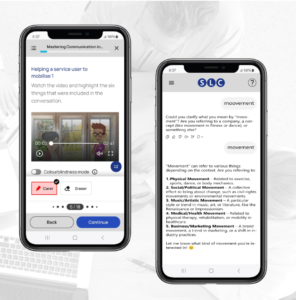
SLC win Ufi grant to develop AI language learning app for social carers
We’re delighted to have won a grant from Ufi VocTech Trust to develop an AI-driven technology solution that provides cheap phone-based language and communication skills

In this quick guide, we’ll explore present perfect and past simple and look at when to use each one. Knowing how to use them accurately will help you in your OET writing, and in communication more generally.
Present perfect is your go-to choice for actions with a connection between past and present. As you probably know, you form present perfect with have or has and the past participle form of the verb. For example:
The doctor has prescribed ramipril.
We often use present perfect to describe unfinished activities using for and since. We use since in a sentence where we indicate when the action began. For example:
He has been in the hospital since August.
We use for in a sentence where we talk about the duration of the action. For example:
He has been in hospital for three weeks.
When there’s a clear time reference, or the action is completed, we use past simple. not present perfect. For example:
He has left hospital yesterday.
He left hospital yesterday.
He has been admitted to hospital last night.
He was admitted to hospital last night.
Which tense and why?
Look at these questions. Which tense (past simple or present perfect) is used and why? You’ll find the answers at the end of this article.
Look at these sentences. Find and correct the mistake in each one. Can you say why they are wrong? You’ll find the answers at the end of this article.
Using present perfect and past simple correctly will improve the accuracy of your communication skills and help you excel in the OET writing test.
Have a look at our video where SLC’s OET Jo explains the differences between present perfect and past simple:
Good luck on your journey to becoming a skilled healthcare communicator!
Specialist Language Courses (SLC) are dedicated to helping healthcare professionals excel in the OET. Our expert-led courses focus on the specific language skills and test strategies needed to succeed. With personalised coaching, practice tests, and targeted exercises, we ensure you build the confidence and competence required for each OET sub-test. Join SLC to boost your chances of achieving the scores you need and advancing your healthcare career
Which tense and why?
1. Why did you decide to become a nurse?
2. How long have you been a nurse?
3. Where did you do your nursing training?
4. Have you worked in your current job for long?
Find the mistakes
1. He was diagnosed with angina for three years.
2. She has undergone surgery yesterday.
3. I’ve had diabetes since ten years.
How many did you get correct?

We’re delighted to have won a grant from Ufi VocTech Trust to develop an AI-driven technology solution that provides cheap phone-based language and communication skills

We’re delighted to announce a partnership with leading Medical English app, Doxa.

Back to Menu ↩ What is the UK Foundation Programme? The UK Foundation Programme is a two-year, structured, work-based training programme which is designed to
Get updates and get the latest materials on Medical English, OET and IELTS
